Is this the least romantic weekend ever?
- Published
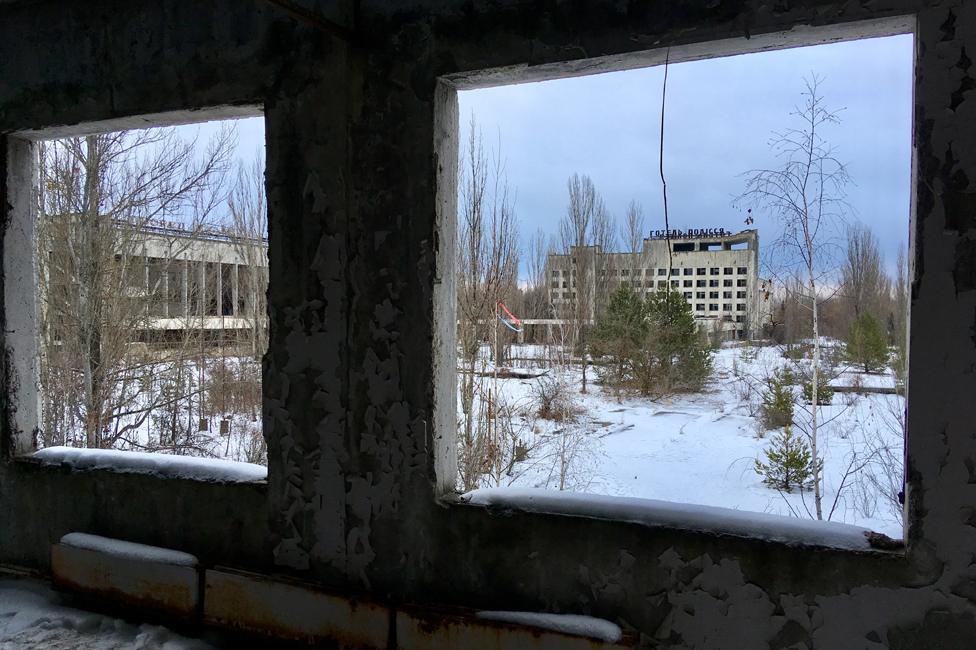
The road runs straight and black into the gloom of the snowy birch forest. It is -5C (23F), the sky is slate-grey and we're in a steamy minibus full of strangers. Not very romantic you're thinking, and I haven't yet told you where we're going.
My wife, Bee, had suggested a cheeky New Year break. Just the two of us, no kids. "Surprise me," she'd said.
Then I met a bloke at a friend's 50th. He told me how much he and his girlfriend had enjoyed a trip to Chernobyl - that's right, the nuclear power station that blew up in the 1980s, causing the worst civilian nuclear disaster in history.
"Don't worry," my new friend declared, a large glass of wine in his hand. "It's safe now."
Well, she'd said she'd like something memorable…
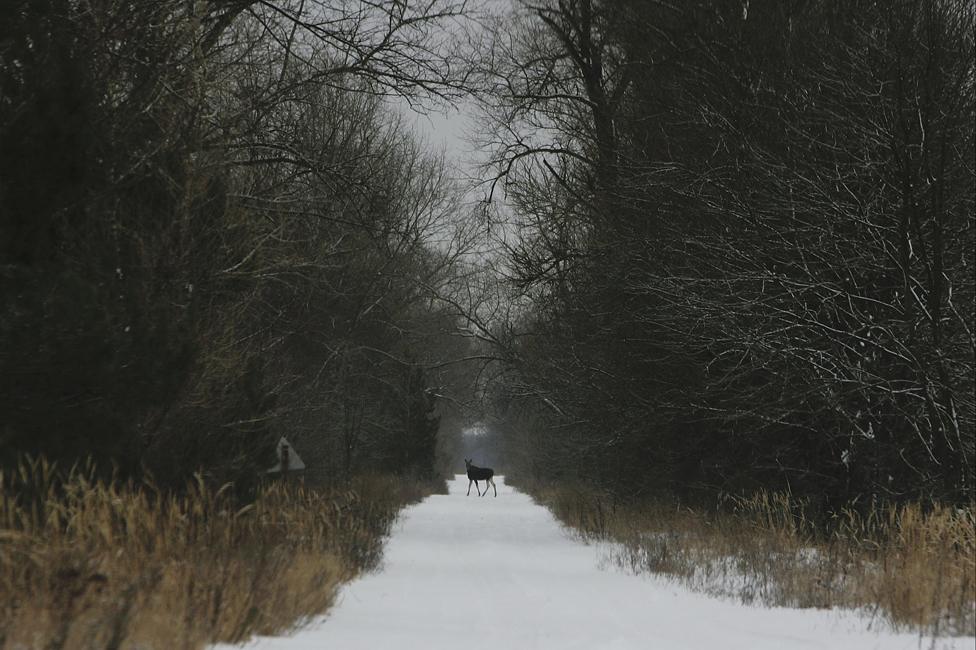

I booked the flights and a tour of the huge exclusion zone created when the Soviet authorities evacuated the 300,000 residents. It was only when I told a couple of female friends my plan that I began to have second thoughts. "You're not serious!" they sputtered, between gales of laughter.
Bee was certainly surprised when she discovered our destination at the departure gate. "Really? Chernobyl?" she asked, with a frown.
On the plane she conceded that it would be interesting, but she was anxious - and with good reason.
Like me, she remembered how the radioactive plume had spread across Europe to the UK, containing 400 times the radioactive material produced by the bombing of Hiroshima and Nagasaki combined.

Find out more
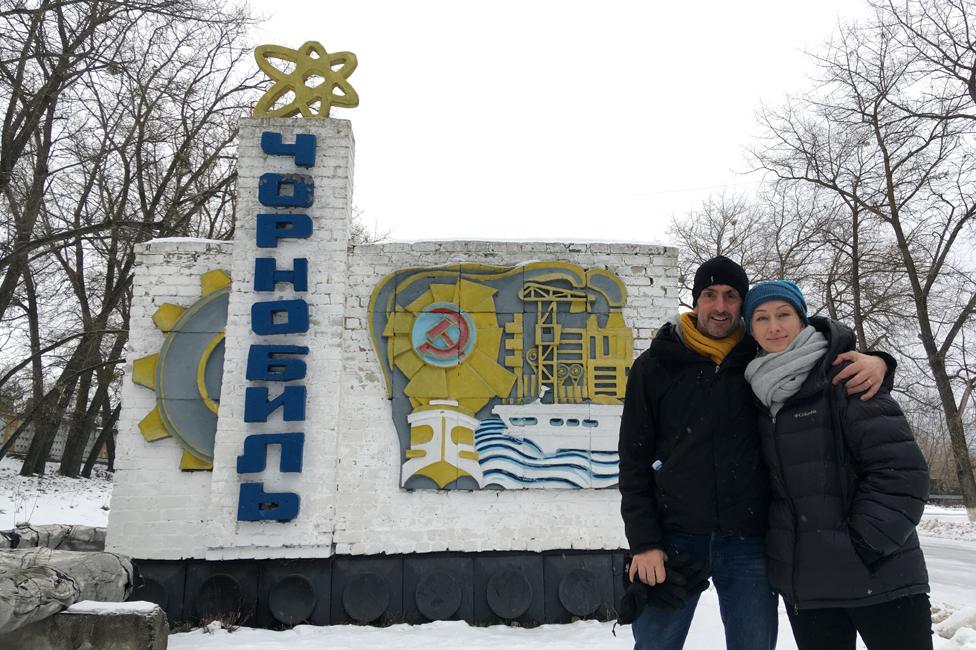
From Our Own Correspondent has insight and analysis from BBC journalists, correspondents and writers from around the world
Listen on iPlayer, get the podcast or listen on the BBC World Service, or on Radio 4 on Saturdays at 11:30 BST

A day later we boarded the tour bus. Our guide, Anastasia, produced a Geiger counter to measure the radiation. It showed 0.23 microsieverts per hour in the centre of Kiev - less than London. "It will be even lower in the zone," she assured us.
It didn't feel safe, though. Soldiers armed with Kalashnikovs inspect your documents at the two checkpoints on the main road and, once inside, it is eerily empty.
The first stop is a kindergarten just a couple of miles from the reactor that blew up, Reactor 4. Dolls have been placed artfully on the wrecked beds by previous visitors - you just click the shutter and select a spooky filter.
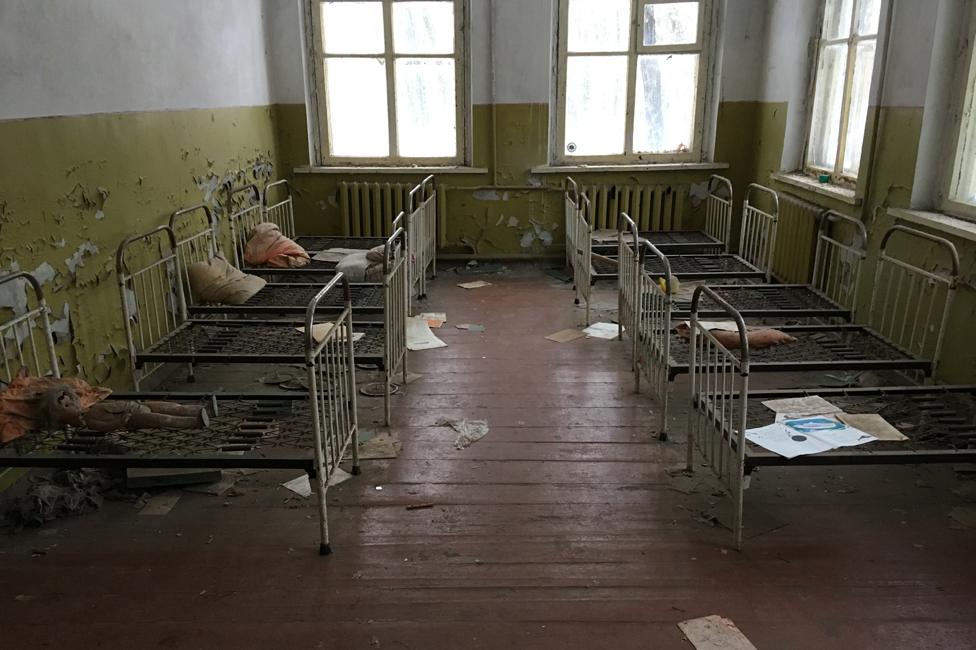
Bee is chilly as we explore the abandoned building, but she is clearly fascinated. And the town of Pripyat, built for the Chernobyl workers, is even more grimly spectacular.
On the bus Anastasia had put on an extraordinary video of its heyday: soaring tower blocks, sweeping boulevards and green lawns all in super-saturated 1970s colour.
Smiling residents wobble by on bicycles. "It was a model town," she tells us. "Foreign visitors would be brought here to see what life could be like the other side of the iron curtain."
Now it is a ghost town, starkly monochrome in winter, the Soviet Union's Pompeii.
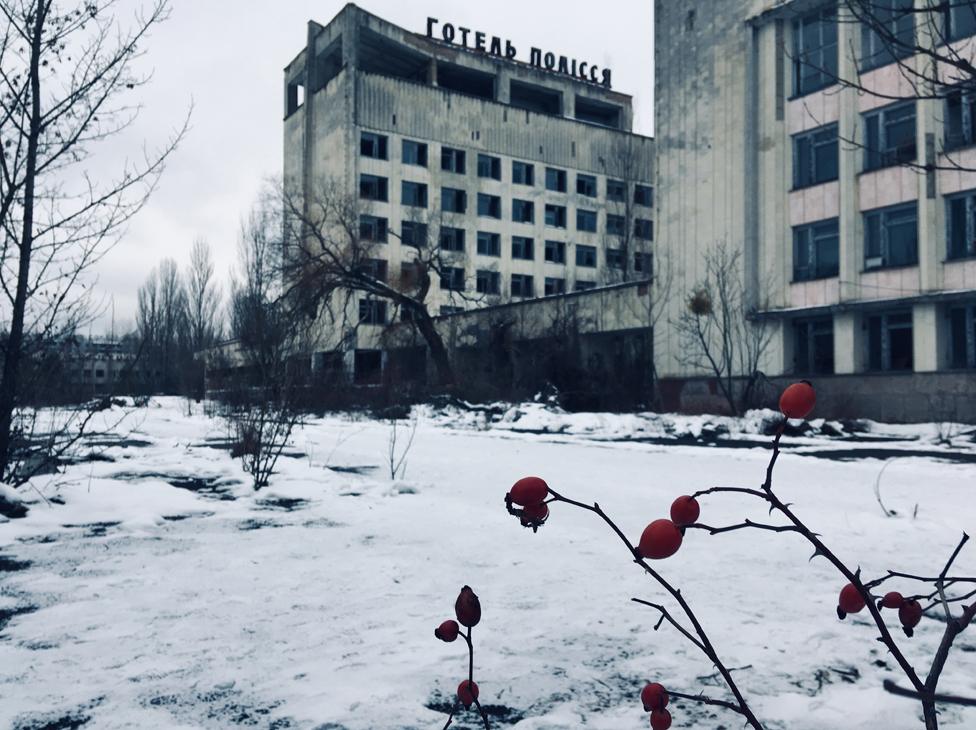

The vast central square is slowly being reclaimed by the forest. Trees have punched up through the concrete and asphalt. The huge apartment buildings stare out dead-eyed.
Anastasia points out the sign that still stands on one of them: "Let the atom be a worker, not a soldier," it reads.
We take the obligatory picture in front of the big wheel in the derelict amusement park.
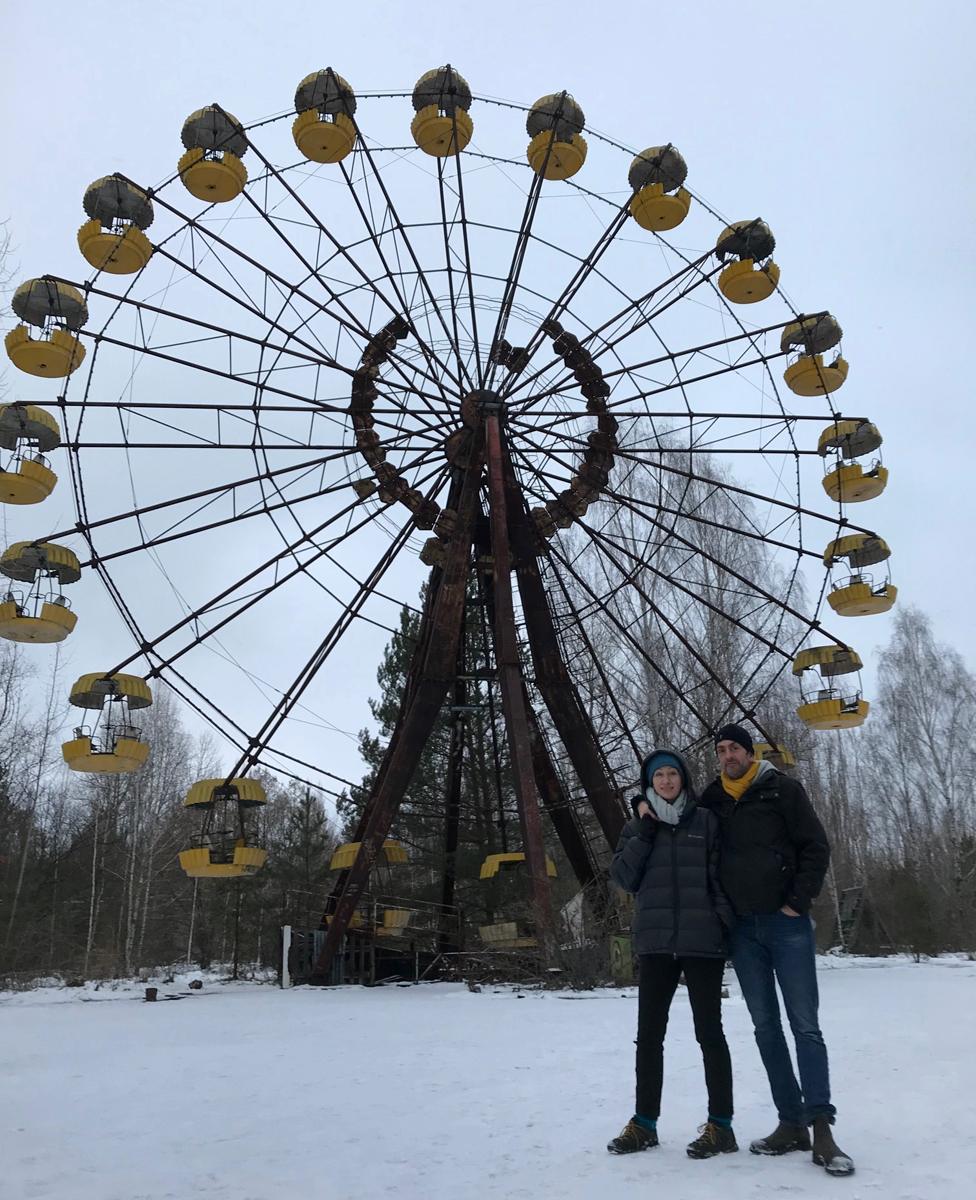

But Anastasia's Geiger counter shows the creepy images make the risk seem greater than it is.
The wreckage of Reactor 4 is now encased in a $1.7bn (£1.3bn) new "sarcophagus", designed to contain radiation for 100 years while the plant is dismantled.
Even here on the viewing platform, 300m away from the giant structure - yes, there is a viewing platform - the reading is just 0.95 microsieverts per hour. You are exposed to more than two microsieverts an hour on the average long-haul flight, external.
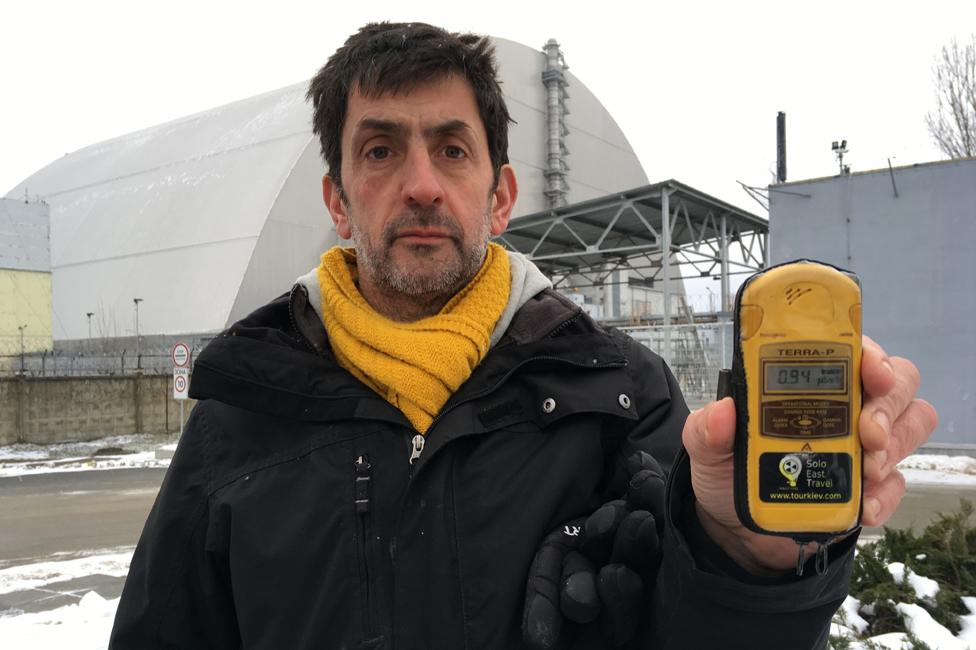
We stop by a monument to the so-called "liquidators", the firemen who died during the clean up after the accident. It is a crude concrete thing but it is obvious that for Anastasia this is the heart of the visit.
These heroes died horrific deaths, she tells us, misled by the Soviet authorities about the real dangers of the disaster they were tackling.
It is evening by the time we get through the last checkpoint. Bee and I buy hot tea from a souvenir kiosk and laugh at the radioactivity phone stickers and fridge magnets with photos of the ruins of Reactor 4.
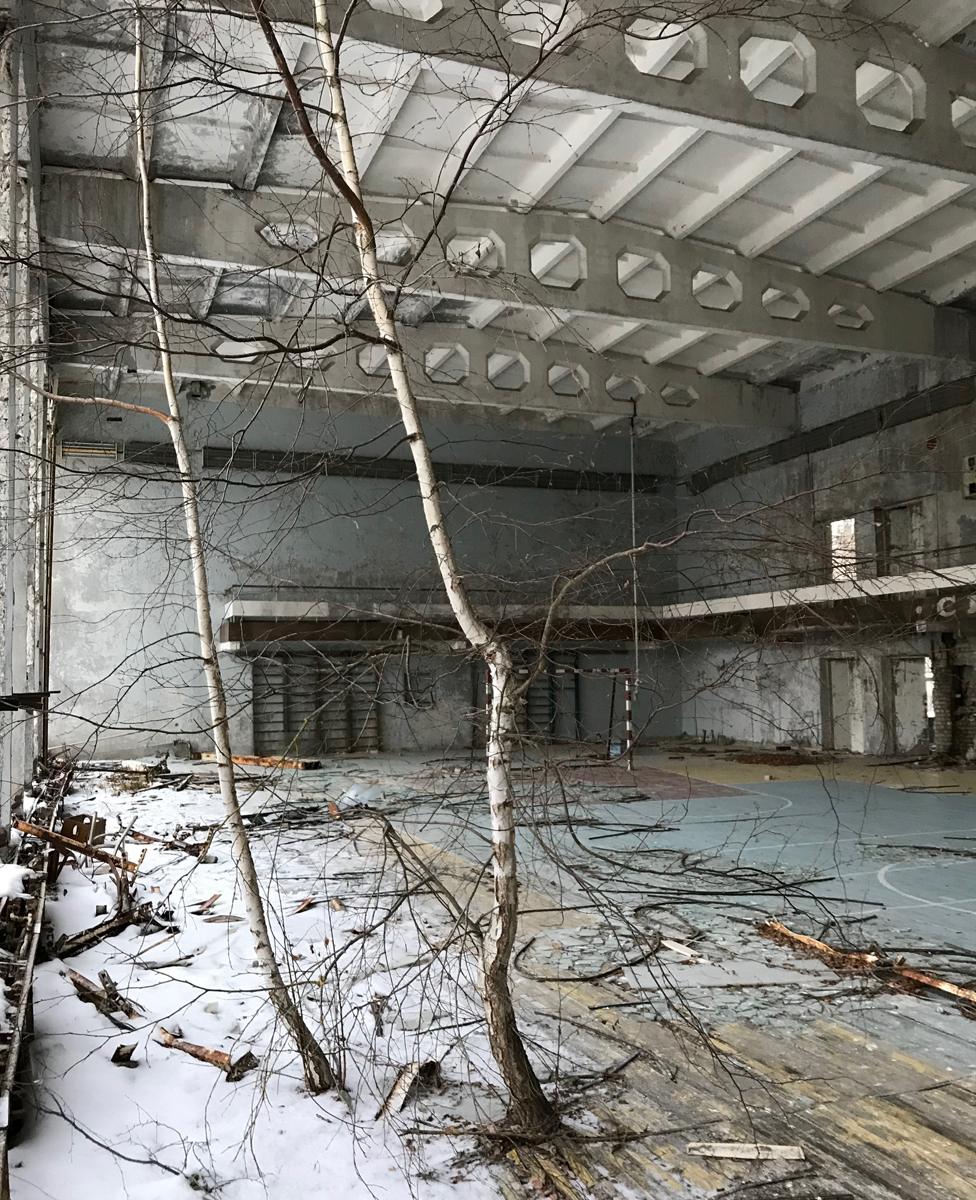

"So what did you think?" I ask nervously.
A flurry of snow swirls around us. Bee sips her steaming tea slowly.
"You know what?" she says, obviously enjoying the moment. "I think this visit has been a reminder of just how resilient nature can be."
She stares meaningfully at me. There is a long pause and then we both laugh.
I lean over and kiss her.
A selection of your comments:
Last year I booked a romantic weekend in a Suffolk windmill that had been converted into lovely accommodation. Everything looked great until my wife asked me where the bathroom & toilet were. I looked everywhere before realising that we didn't even have running water and our ablutions and washing up would need to take place 50m away in a cold outhouse. It took a fair few Proseccos to break the ice on that trip, I can tell you! Will Linsdell, Coulsdon, Surrey
About 20 years ago, my then-boyfriend had booked for us to go away for the Valentine's weekend to a lovely hotel in the New Forest. The night before we were due to go away, I was writing his Valentine's card when I dropped the pen lid on the floor. In bending down to pick it up, I hit my head on the edge of the desk and ended up with concussion, whiplash and an absolute shiner of a black eye! Needless to say, our romantic weekend was a total washout! To crown it all, I then got conjunctivitis in my bruised eye. I was off work for the best part of two weeks and had to see an osteopath over the next 6 months to sort my neck out. Not quite what we had in mind! Ursula Pearce, Fareham, Hants
In 1972 I took my wife on a spring break to Varna, Bulgaria to celebrate our 5th wedding anniversary. What a mistake it turned out to be. If I ever needed evidence that communism makes people unhappy this city, dubbed " the pearl of the Black Sea, provided ample evidence. Long queues to buy bread and other staple commodities. No evidence of any public transport, let alone cars, along the city's wide boulevards. Heroic statues and buildings providing a backdrop to a 1984 dystopia. And the most miserable, unsmiling people it has ever been my misfortune to encounter. As an antidote to the lifestyle enjoyed in western Europe it served as a potent reminder of how our lives are governed by an accident of birth and how we should not take simple freedoms for granted. More a social education than a romantic break. Miles Wilson, Conil, Spain
Join the conversation - find us on Facebook, external, Instagram, external, YouTube, external and Twitter, external.
